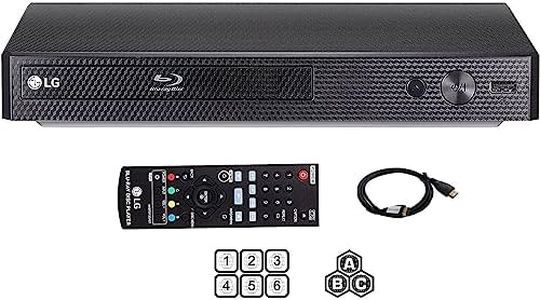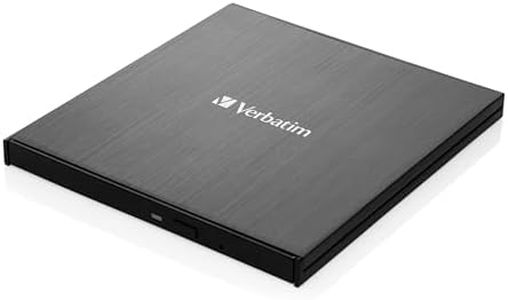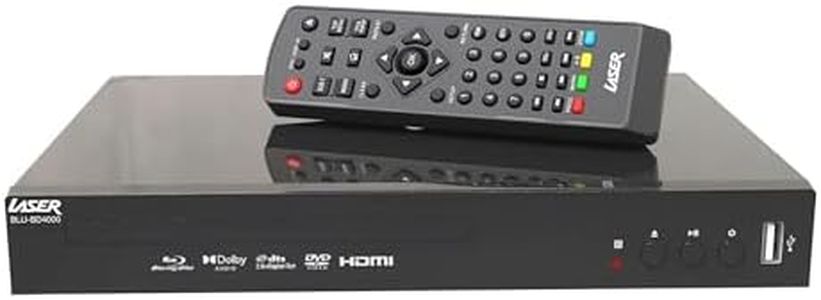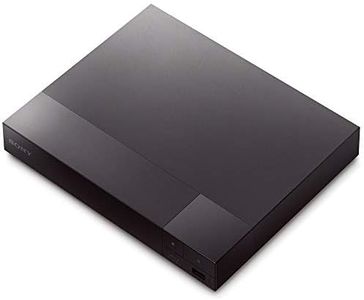We Use CookiesWe use cookies to enhance the security, performance,
functionality and for analytical and promotional activities. By continuing to browse this site you
are agreeing to our privacy policy
10 Best Blu Ray Dvd Players
From leading brands and best sellers available on the web.By clicking on a link to a third party's website, log data is shared with that third party.
Buying Guide for the Best Blu Ray Dvd Players
When choosing a Blu-ray or DVD player, it's important to think about how you'll use it, what features matter most to you, and how it will fit into your existing home entertainment setup. The right player should be easy to use, compatible with your TV or audio system, and offer a good balance of quality and convenience. Understanding the main specifications will help you pick a player that meets your needs whether you love watching the latest high-definition movies, rely on older DVDs, or want to enjoy streaming and smart features.Disc CompatibilityDisc compatibility tells you what types of discs a player can handle, such as standard DVDs, Blu-ray discs, 4K Ultra HD Blu-rays, and even older formats like CD or audio CDs. This spec is important because it determines which movies and media you can play. Some players only support DVDs, while others play both DVDs and Blu-rays, and there are advanced ones that also support 4K Ultra HD discs. If you have a collection of different types of discs, or plan to upgrade to higher-quality formats in the future, choosing a more versatile player will give you more viewing options.
Video Output ResolutionVideo output resolution is the highest quality of picture the player can send to your TV, such as 480p (standard DVD), 1080p (Full HD Blu-ray), or 4K (Ultra HD Blu-ray). This affects how clear and detailed your movies look. To decide, check what your TV supports. If you have a standard HD TV, a 1080p (Full HD) player will look great, while a 4K player is ideal for 4K TVs to fully enjoy ultra-sharp images. If your TV is older or smaller, a lower resolution might be fine, but pairing resolution with your TV's capabilities ensures the best viewing experience.
Audio Support and OutputsAudio support and outputs refer to the kinds of audio formats the player can decode (like Dolby Digital, DTS, or Dolby Atmos), and the ways you can connect to sound systems (HDMI, digital optical, analog RCA, etc). This matters for getting good sound and making sure the player works with your speakers or home theater. If you only use your TV's built-in speakers, basic audio support is usually enough. For surround sound or home theater systems, look for players with advanced audio decoding and the appropriate connections to match your audio equipment.
Smart Features and StreamingSmart features and streaming refer to internet-connected functions like built-in apps for Netflix, YouTube, or other streaming services. These features can turn your Blu-ray/DVD player into a mini media hub, so you can watch not just discs, but also stream content online. If you already have a smart TV or streaming devices, you may not need this, but for those who want an all-in-one device or are adding smart capability to an older TV, these features add extra value and convenience.
ConnectivityConnectivity is about the types and number of ports on the player, such as HDMI, USB, Ethernet, or Wi-Fi. Good connectivity options ensure you can hook the player up to your TV, network, or external drives with ease. If you want to play media from a USB stick, stream over Wi-Fi, or use network features, look for the necessary ports and wireless capabilities. Matching the player's connectivity to your TV and home setup ensures everything works smoothly and you won't need extra adapters.
Load and Start-up TimesLoad and start-up times are how quickly the player powers on and begins playing discs. Some players are faster, while others might take longer to start or load a movie. This is mostly about convenience—if you dislike waiting, look for models that are known for quick start-up and disc loading. For most users, faster is usually more enjoyable, especially if you're used to streaming content that starts instantly.
Region Code SupportRegion code support indicates whether the player is limited to discs from certain parts of the world (region-locked), or if it can play discs from anywhere (region-free). If you buy or collect discs from other countries, or want to avoid compatibility headaches, look for a region-free player. If you only use locally purchased discs, region locking is not usually a big issue.
















